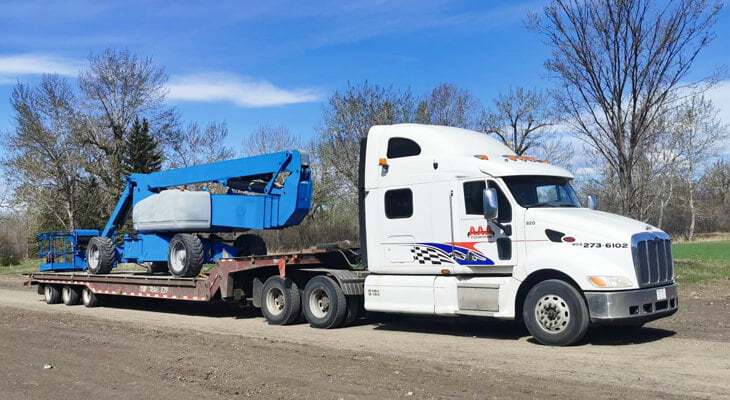
When it comes to heavy equipment hauling, you can’t afford to cut corners. It’s a process that demands precision, careful planning, and a thorough understanding of the machinery you’re transporting. Heavy equipment hauling involves transporting large machinery, vehicles, or equipment that typically weigh several tons.
This is not your typical moving job. It requires specialized trailers, rigging equipment, and often, the ability to navigate complex regulations. In this blog, we’ll explore the essential considerations for heavy equipment hauling.
We’ll cover everything from choosing the right transport equipment and understanding legal requirements to securing the load and ensuring driver expertise.
Planning and Preparation
Planning is key when it comes to heavy equipment hauling. Before you begin the transportation process, it’s essential to assess the equipment you’ll be hauling and plan the route accordingly.
- Equipment Assessment: Start by evaluating the size, weight, and dimensions of the equipment you need to transport. This will help you determine the type of trailer and transportation method required for the job.
- Route Planning: Plan the route carefully, taking into account any obstacles such as low bridges, narrow roads, or weight restrictions. Utilize specialized route planning software to identify the most efficient and safe route for transportation.
- Permits and Regulations: Obtain the necessary permits and adhere to local, provincial, and federal regulations regarding heavy equipment hauling. Failure to comply with these regulations can result in fines and delays.
Choosing the Right Equipment
Selecting the appropriate equipment for heavy equipment hauling is essential to ensure the safety and efficiency of the transportation process.
- Trailer Selection: Choose a trailer that is specifically designed for heavy equipment hauling. Options include flatbed trailers, lowboy trailers, and extendable trailers, each suited for different types of equipment.
- Securement Equipment: Invest in high-quality tie-downs, chains, and straps to secure the equipment to the trailer securely. Proper securement is critical to prevent shifting during transit.
- Safety Equipment: Equip the hauling vehicle with safety equipment such as reflective markings, warning lights, and flags to ensure visibility on the road.
Hiring a Professional Hauling Company
While some may attempt to haul heavy equipment independently, it’s often safer and more efficient to hire a professional hauling company.
- Experience and Expertise: Look for a hauling company with experience in transporting heavy equipment. Experienced professionals understand the intricacies involved in heavy equipment hauling and can ensure a smooth and efficient process.
- Specialized Equipment: Professional hauling companies have access to specialized trailers and equipment designed specifically for heavy equipment transport. This ensures that your equipment is transported safely and securely.
- Insurance and Liability: Working with a professional hauling company provides peace of mind knowing that your equipment is insured and protected throughout the transportation process. In the event of an accident or damage, the hauling company is liable for any repairs or replacements.
Safety Considerations
Safety should always be a top priority when it comes to heavy equipment hauling.
- Proper Loading and Securement: Ensure that the equipment is loaded onto the trailer correctly and securely. Use the appropriate tie-downs, chains, and straps to prevent shifting during transit. Avoid common towing mistakes at all cost.
- Adherence to Regulations: Follow all local, provincial, and federal regulations regarding heavy equipment hauling. This includes weight limits, route restrictions, and permit requirements.
- Regular Maintenance: Keep hauling vehicles and trailers properly maintained to prevent breakdowns and ensure safe transportation.
Cost Considerations
Heavy equipment hauling can be costly, so it’s essential to consider the financial implications before embarking on a transportation project.
- Fuel Costs: Heavy equipment hauling requires large, powerful vehicles that consume a significant amount of fuel. Factor in fuel costs when budgeting for your hauling project.
- Insurance Premiums: Insurance for heavy equipment hauling can be expensive due to the high value of the equipment being transported. Make sure to include insurance premiums in your budget.
- Labour Costs: Hiring a professional hauling company will incur labour costs. While this may seem like an additional expense, it can save you time and money in the long run by ensuring the safe and efficient transport of your equipment.
- Equipment Rental: If you don’t own hauling equipment, you may need to rent trailers and other specialized equipment. Factor in the cost of equipment rental when budgeting for your project.
- Unexpected Expenses: It’s essential to budget for unexpected expenses such as repairs, permits, and route changes. Having a contingency fund can help cover these costs and prevent delays in your hauling project.
About AAA Towing
AAA Towing is a leading towing and hauling company serving customers throughout Canada. With years of experience in heavy equipment hauling, we specialize in transporting oversized machinery safely and efficiently.
Contact us today for all your heavy equipment hauling needs.
